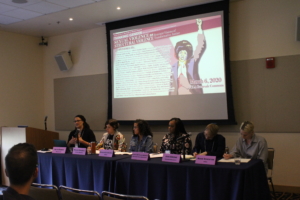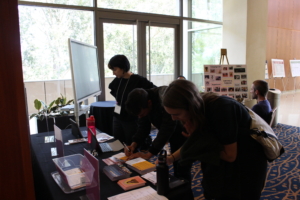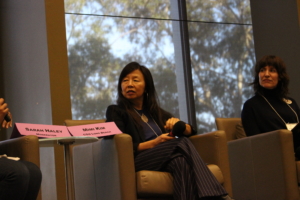Thinking Gender: Sexual Violence as Structural Violence: Feminist Visions of Transformative Justice, with reflection and gratitude
By Bri-Ann Hernandez

Thinking Gender Moderator Alisa Bierria and Roundtable Presenters Melanie Brazzell, Marina de Oliveira Reis, Ayanna De’Vante Spencer, Joss Greene, and Rosie Stockton
On March 6, 2020, the UCLA Center for the Study of Women welcomed 33 student presenters from 13 colleges and universities across the world to Thinking Gender 2020: “Sexual Violence as Structural Violence: Feminist Visions of Transformative Justice.” As the graduate student organizer of this year’s conference, it was such a pleasure working together with CSW faculty, staff, and student workers who were just as committed to making this conference as organized and intellectually stimulating as possible every step of the way. Prior to joining CSW in July 2019 for the TG20 Coordinator role, I had just wrapped up organizing another conference at UCLA. This experience by far exceeded my expectations in terms of organization, work culture, social support, coordination of skills, and implementation of day-to-day tasks, as well as the conference overall. I couldn’t have done it without the CSW team.
I was also deeply impressed by the breadth of approaches and depth of attentiveness of these brilliant and creative scholars’ timely work. Their presentations centered anti-imperialist, anti-racist, intersectional, and abolitionist approaches for understanding sexual violence, and took many forms and expressions. These diverse expressions introduced me to new perspectives and methods, current activism, and neglected histories as well as re-imagined remedies to sexual violence in ways that challenge a culture where punishment and imprisonment are the main responses to societal problems. A playlist of the conference panel and roundtable presentations is available on CSW’s YouTube channel. You can also read a selection of papers and posters from the conference that were submitted to eScholarship.
Our keynote panel revealed just how vital these priorities are. The panelists, Mariame Kaba (Project NIA), Mimi Kim (CSU Long Beach), and Emily Thuma (University of Washington Tacoma), and moderator, Sarah Haley (UCLA), had an engaging and challenging conversation about the past, present, and future of sexual violence activism and scholarship. Before an audience of 262 people, they articulated the most pressing issues they are organizing around and contextualized these concerns in a larger constellation of activism. Perhaps the most crucial challenge they left the audience with was to achieve a sense of clarity on what a transformative justice practice truly entails. Transformative justice, they noted, must extend beyond the classroom and should be practiced in our everyday lives as a form of skill building. This could take the form of holding ourselves accountable to the “little things” so that we are better equipped to handle the “big things.” Listen to the opening address, the keynote presentation, and the keynote panel discussion on CSW’s YouTube channel.
To my understanding, the task of abolitionist feminists is to maintain the centrality of life. What remedies emerge when we think of sexual violence as a function of state and capitalist violence, rather than only caused by the actions of a particular individual that can be addressed through punishment? What histories of feminist Indigenous, queer/trans, anti-racist, and anti-colonial organizing against sexual violence can we excavate as durable traditions for doing so? What is needed right now to affirm and support the lives of those who are placed in close proximity to precarity? What is our vision of a world where responses to harm are not dictated by punishment, containment, disappearance, and violence?

Attendees visit the Exhibit to sign postcards urging Governor Newsom to drop Life Without Parole (LWOP) sentencing and watch short story videos of incarcerated survivors
The answers to these questions were discussed throughout the conference at panels, roundtables, and the keynote panel. They were further contextualized in the Survived & Punished exhibit featuring a collection of online petitions, postcards, photos, and video compilations that showcased stories of criminalized survivors of sexual and domestic violence and the grassroots efforts to free them. The purpose of this exhibit was to encourage advocates to sign postcards and petitions urging Governor Newsom to free survivors of domestic violence and sexual violence by ending Life Without Parole (LWOP) sentencing for self-defense. To see the Survived & Punished video compilation, visit CSW’s online exhibit.
Ultimately, Thinking Gender 2020: Sexual Violence as Structural Violence: Feminist Visions of Transformative Justice was a beautiful, immense, challenging, and stimulating conference. I am deeply grateful to all who contributed, and CSW will continue to bolster opportunities for spaces that share a radical vision of feminist abolitionist futures.
To receive updates on future “Thinking Gender” conferences and other CSW events, join the CSW Mailing List!
Bri-Ann Hernandez is a first-year MPH student in the Community Health Sciences department at the UCLA Fielding School of Public Health. In addition to organizing the TG20 conference, she is a Research Fellow for Ms. magazine and a Student Ambassador with the UC Global Health Institute Women’s Health, Gender, and Empowerment Center.



Comments are closed.